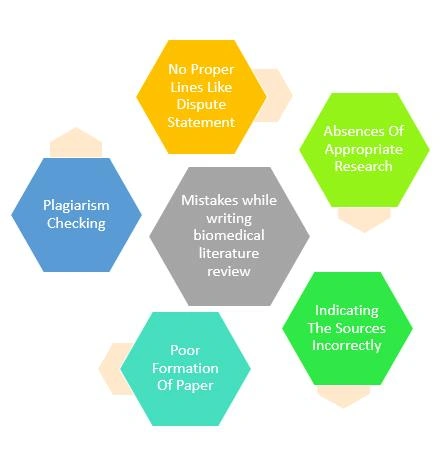
Research Proposal for Phd Application Biotechnology
July 24, 2020
A Kidney Transplant Patient With Mild Covid‐19
July 29, 2020A literature review can be considered as a published material in a biomedical research subject, a specialized area with certain time duration, and it also provides review books, scholarly articles, and related to research publication. A literature review writing can be a just simple outline of the source, which helps to recollect all the given information. It can analyse old materials or links with new analysis. Literature review articles may incorporate in many useful reports that keep them update with current fields, and literature review helps the most appropriate and applicable.
Brief
- A literature review is essential in dissertation writing to understand the current state of the subject area and the need for further study.
- There are several mistakes that may happen while writing an effective literature review includes no proper lines like dispute statement, absences of appropriate research, indicating the sources incorrectly, the poor formation of paper, plagiarism checking.
- Writing a quality literature review requires expert’s guidance and Pubrica have experts focused on biomedical research as providing complete and customized support on literature review writing for dissertation on biomedical research.
How To Write A Literature Review
While literature review writing, first you need to have a good idea about the topics or research, there must be enough research journals, published materials, and articles. Then the length and extent of literature review depending on the project title selection, and the sources should briefly classify, considering or finding out authority, dispute, and division, sketching the outline finally writing a literature review article.
Purpose of A Literature Review
The primary objectives of writing a literature review are to know about the background of the research paper on a thesis, some of the backgrounds are
1. The analytical background which deals with previous/current/outlook
2. The technique or research methods
3. Clinical system
4. Earlier findings
5. Logically or related to the current study
6. Differentiating what has been done and what to be done
7. Identifying essential variables related to the topics
What Is Biomedical Research
Biomedical research is the extensive area of science that gives more attention to prohibit and treat diseases that induce illness and death in people and in animals too. And this approach can be made by chemical, statically, computer simulations, in vitro, animal models, human epidemiological studies, and now it is streaming in clinical trials to develop new drugs, treatment, curing, and preventing diseases. This broad field of research has many areas in both the life sciences and natural sciences. By using some techniques like biotechnology, biomedical research, the process of study, and the treatment is more effective in curing treatment.
Three Types Of Biomedical Research
Basic Biomedical Research
Basic research regulates to increase basic knowledge, and which cannot be able to solve any particular problems by directly. It provides building blogs for the other types of researches; it will be the starting point of research paper on a specific disease
Applied Biomedical Research
It will be a second step which directs towards a particular objective, like improving a new drug, therapy, operations, procedures
Clinical Biomedical Research
The final step, clinical trials which involve in humans, used to test whether the drugs are potentials for curing diseases, by following basic and applies steps then the drugs were applied directly to humans and individuals should be observed by behaviours research and disease control research.
Five Common Mistakes While Writing Literature Review For Biomedical Research:
1. No Proper Lines Like Dispute Statement
While writing a literature review based on biomedical research, it should have a strong argument most of the students do not care about it. Hence if you are going to write a literature review first, we have to make sure that we are pointing out on the main topics, writing a review of literature is not a description writing it is an outline of our research. So, before writing a review, the topic should gather all available sources. Then do neat literature writing.
2. Absences Of Appropriate Research
While writing biomedical research, the paper should focus on related research papers. There are no issues whether the paper is long or short; it should convey to the researches accurately, and they should get clear ideas about those particular topics.
3. Indicating The Sources Incorrectly
Many types of research do not add correct references that hold the key clashes in the introduction and the discussions. And it cannot be published. Then make sure each journal has particular guidelines on cite resources, do not take these guidelines, and follow them correctly.
4. Poor Formation Of Paper
They are so many challenges in literature review some challenges like the reader should engage in the paper, some strong question in between the paper, there should be no unnecessary questions, there should be some supportive statements, beside each every structure there should be an acknowledgement of the pictures.
5. Plagiarism Checking
It will be the final step and important step, like no copywriting from other research articles. Then it will be more advisable, and the paper should be written by yourself. Make sure to maintain authenticity.

Conclusion
In summary, the main purpose of writing an effective literature review in biomedical research dissertation is to provide a narrative on published articles to analyse and summarise the body of proposed research. Biomedical research allows to study medicine issues and problems using various methodologies, and it is very important to define the literature gap and need for the present study. To reduce pressure and produce quality literature review section, our experts will support you throughout this process in biomedical literature review writing without any mistakes.
References
- Ammenwerth, E., & De Keizer, N. (2005). An inventory of evaluation studies of information technology in health care. Methods of information in medicine, 44(01), 44-56.
- Baumeister, R. F., & Leary, M. R. (1997). Writing narrative literature reviews. Review of general psychology, 1(3), 311-320.
- Bischoff-Ferrari H. A. Optimal serum 25-hydroxyvitamin D levels for multiple health outcomes. Advances in Experimental Medicine and Biology. 2008; 624:55-71.
- Hyland K. Academic Discourse: English in a Global Context. New York: Continuum, 2009.
- Wei EQ. Writing Biomedical Research Papers in English. Beijing: Science Press, 2006





